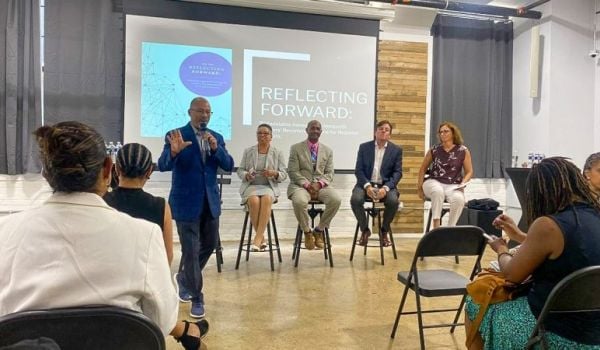The Ritz at the Bourse Theater sits just one block away from Philadelphia’s Independence Hall, where a group of privileged and aggrieved male colonists first declared their independence from Britain over two centuries ago. The following decade, a similar set debated and ultimately succeeded in drafting a document that exclusively secured its personal and political rights, leaving little for anyone else.
Although significant progress has been made from this Constitutional framework, New York filmmakers Amy Sewell and Susan Toffler, who hosted a screening of their documentary, what’s your point, honey? at the Ritz last Thursday evening, believe there are still some major gains to be made.
What’s your point, honey? explores gender inequality in American culture, an issue the filmmakers believe has largely been overlooked by the public. “What we’ve learned from this whole Hillary thing is that people are waking up to the fact that [inequality] has been subtle, but it’s still there,” says Toffler. “We’re not as far along as we might like to think.”
Similar to Sewell’s previous film, the award-winning documentary Mad Hot Ballroom, children play a critical role in what’s your point, honey? Armed with pockets full of loaded questions, three 10 year-old “tween” girls cruise the streets of New York on their scooters interrogating young boys and men about the possibility of a female president. Answers range from the sincere, such as from the West African postal worker whose home country already has a female head of state, to the patronizing, such as from startled-looking men who can only offer, “What are we going to do about it?”
For Sewell and Toffler, dialogue is the first step, with the film serving more as a conversation starter about gender inequality than an attack on the institutions that have traditionally left women underrepresented. While the film entertains the idea of seating a woman in the Oval Office by the year 2024, what’s your point? pushes the greater goal of equal representation in business and politics. And it does so without so much as a glimpse at the women who’ve successfully cracked the outer walls of Washington.
Indeed, the only time politicians of either gender are shown in the film are in the halls of Madame Tussauds, where the waxen likenesses of President Bush, John F. Kennedy and Sen. Hillary Clinton take on their most monolithic forms. It is an endearing and honest moment enhanced by the three young girls who pose playfully at the sides of these stoic political heavyweights — a scene that dutifully serves the larger aim of the documentary.
Rather than focus on Sen. Clinton — who Sewell and Toffler are quick to point out announced her candidacy well after they began filming in 2005 — or any other seated politician, the film instead follows seven 20 year-old girls from universities across the country as they pursue internships at various New York firms, from the National Football League to, in an unfortunate coincidence, the office of former New York Governor Eliot Spitzer. All seven girls were finalists of Project 2024, an annual collaboration between CosmoGirl! magazine and The White House Project promoting the equal representation of women in politics, business and culture through real-world experience.
Sewell and Toffler wanted to showcase these ordinary girls as realistic role models for younger generations as a way to “pass the baton of the fight against gender inequality,” as Sewell says. “If you look at seven 20 year-olds and they’re doing public service now, they’re going to be doing it later. This is who we want to run for president.”
“You can’t be what you can’t see,” Toffler says.
Too often, the film suggests, what young audiences do see are the pervasive and potentially harmful media messages embedded in popular culture and advertising, which can profoundly shape and reinforce how children and teenagers perceive gender.
While the interweaving narratives of seven college students, three 10 year-olds and a group of 15 year-olds nearly prevent the film from having a central focus, all the essentials of an informed conversation about gender are present — history, politics, economics, popular culture and media analysis. Through this well-rounded combination, Sewell and Toffler have succeeded in their presentations of positive, real-world role models for the younger generation in a greater context.
As to whether the film succeeds in its attempt to move politics “beyond gender to agenda,” maybe even to the point of electing a female president, only time will tell.
















